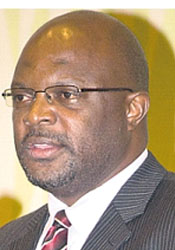(Barbados Nation) Financial investigators pursuing money launderers no longer have to fear being sued by suspected felons or financial institutions during the course of their probes.

Attorney General Adriel Brathwaite on Tuesday outlined a number of stringent measures in the House of Assembly to combat money laundering and terrorism that give greater authority to investigators and place increased responsibilities on companies. The legislation will be administered by the Anti-Money Laundering Authority.
During debate on the Money Laundering and Financing Of Terrorism (Prevention And Control) Bill, 2010, Brathwaite said the legislation would more forcibly reflect the 40 recommendations of the Financial Action Task Force (FATF) that Barbados is committed to implement because of its membership in the FATF’s associate member, the Caribbean Financial Action Task Force. Brathwaite told the Lower House the bill sought to protect people whose businesses were susceptible to abuse by money launderers, protect those who were vulnerable to people financing terrorism and to train people to develop and implement measures to detect and prevent such abuse.
The Attorney General went through a number of upgrades to the legislation, including a new clause that gave immunity from law suits to members of the Financial Intelligence Unit [FIU] in respect of acts done “in good faith in performing duties” of exercising their powers under the legislation. The FIU was established over a decade ago to go after people transacting in “dirty money”.
Brathwaite said the legislation imposed duties that would be much more comprehensive than currently existed.
He stated this related to verification of the identities of customers, financial institutions and non-financial business entities and professionals.
He said there was a responsibility on these entities to establish the true identities of their customers and verify those identities by means of reliable documents, data or information from independent sources.
The St Philip South MP added that they also had to develop audit functions to evaluate policies, procedures and controls. If a financial institution, a non-financial business entity or professional did not maintain transaction records, Brathwaite said, they could face sanction of a $100 000 fine.
He noted the legislation provided penalties for money launderers of up to a $2 million fine, 25 years incarceration, or both, if convicted indictably.The legislation also provides for the entering by authorised persons onto the premises of financial institutions during normal working hours “or at any other reasonable time” for the purpose of conducting an inspection.
During his contribution to the debate, Deputy Opposition Leader Dale Marshall said the Barbados Labour Party fully supported the legislation and admitted there were many people in Barbados involved in money laundering.




